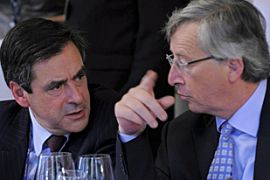EU gives Ireland time over treaty
Ireland’s rejection of the Lisbon treaty and rising fuel prices top agenda in Brussels.

Micheal Martin, the Irish foreign minister, said that his government does not anticipate resolving the impasse before the next EU summit in October.
“We need time and space to analyse the results and the underlying attitudes to the union itself,” he told reporters.
“There’s no question of getting it in the neck. Europe has been through these scenarios like this in the past.”
A total of 19 countries have endorsed the treaty but all 27 members must ratify it for it to come into force.
The other member states were expected to affirm their intention to continue with the ratification process, while promising Ireland time to figure out its next step.
Al Jazeera’s Mark Seddon, reporting from Brussels, said there was a lot of disappointment within the European Union about the “no” vote.
“They wanted real progress … they wanted the foreign minister for Europe, streamlining and of course Balkan membership of the EU coming in as well. All that gets put on hold, its all going to slow up,” he said.
The issue is expected to dominate the two-day summit in the Belgian capital but several leaders said they should be dealing with the rising fuel prices which have provoked protests across Europe.
Fuel policy
A senior official from the office of Nicolas Sarkozy, France’s president, said he would ask EU peers to back a reduction in value-added tax on petrol across the 27-nation bloc to help fishermen, farmers and hauliers hit by soaring costs.
However, before leaving Berlin for the summit, Angela Merkel, the German chancellor, told parliament that financial policy intervention should be avoided.
French ministers have said Europe’s failure to respond to distress over petrol prices made the the EU look as though it was remote to citizens’ concerns, and could have been one reason why Irish voters rejected the Lisbon treaty in a referendum last week.
While stressing he had not seen the French proposals, David Miliband, the British foreign secretary, said that in his view the most appropriate way to control prices was to ensure that supply and demand are in balance.
“I think that the heads of government and foreign ministers will be discussing food and oil prices today,” Miliband said.
“It’s very important there is a much closer dialogue between suppliers and consumers and most important on the consumer side is obviously to reduce long term demand for oil so that the supply and demand can come to a better balance.”
EU finance ministers have already unanimously reaffirmed their opposition to distortionary tax measures that prevent consumers and businesses from adapting to long-term expensive energy costs.
Barroso has said the EU must respond by adopting energy efficiency measures and turning goals for reducing greenhouse gas emissions and switching to renewable energy sources into law.